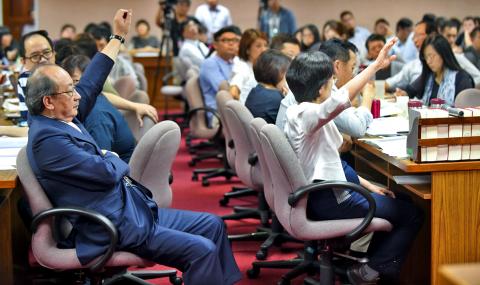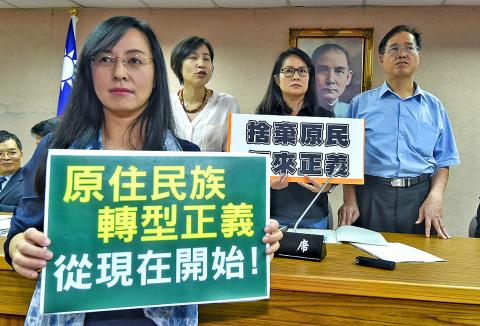Draft legislation for promoting transitional justice yesterday passed out of the legislature’s Judiciary and Organic Laws and Statutes Committee, but after a sharp debate, the final draft left out a proposal covering the restoration of historic Aboriginal rights.
Yesterday was the first day of line-by-line review, which concluded when Chinese Nationalist Party (KMT) legislators walked out of the meeting late in the afternoon after losing votes to expand the scope of the draft legislation to include Aboriginal issues, along with a range of other historic injustices and controversies.
The draft legislation proposed by the Democratic Progressive Party (DPP) caucus focuses on the human-rights abuses perpetrated by the KMT government during the Martial Law era, calls for the establishment of a special committee to investigate abuses and proposes legislation on issues such as opening government files, rectifying unjust verdicts and removing symbols of authoritarianism.

Photo: Liu Hsin-de, Taipei Times
It passed the committee stage with only minor modifications.
Prior to their walkout, KMT committee members had sought to drag out the review with extended procedural remarks criticizing the focus of the draft legislation.
KMT Legislator Lin Wei-chou (林為洲), who serves as one of the committee’s convenors, said that while he could support new investigations into historic human rights abuses, the proposed focus on “justice” was overly subjective.

Photo: Liu Hsin-de, Taipei Times
“If this legislation was just about finding out the truth, I think it would be a lot easier for us to get on track because there would be objective standards to evaluate it,” he said.
“‘Justice’ is subjective and turns this law into a value judgement on a historical period. Evaluating more than 40 years of history is a huge and difficult project. Why does this bill have to pass within just one legislative session,” he said.
KMT caucus whip Lin Te-fu (林德福) called for the scope of the legislation to be expanded to cover the abuse of “comfort women” during Japanese colonial rule.
“Any legislation passed today should be complete, rather than partial and one-sided,” Lin said.
KMT Legislator Lee Yan-hsiu (李彥秀) reiterated the party’s claims that it was unfairly targeted.
“We are not here to stop legislation to promote transitional justice — we are here to stop a version that is full of holes, which is focused on power struggles and settling scores,” Lee said.
Only the DPP caucus’ proposal was presented for committee review, sparking sharp criticism from Aboriginal legislators with the KMT, New Power Party (NPP) and People First Party’s (PFP) for leaving out alternative versions that would have included violations of Aboriginal rights.
Aboriginal DPP Legislator Chen Ying (陳瑩) joined the other Aboriginal lawmakers in briefly occupying the convener’s podium in protest during a break in the review.
“We Aborigines are anxious that if we miss this train, there is no way we can be certain when our turn will come,” Chen said.
DPP caucus whip Ker Chien-ming (柯建銘) said that legislation related to Aboriginal transitional justice issues would still be addressed by the legislature and he criticized the KMT for failing to address the issue during the decades that it was the majority party in the Legislative Yuan.
“The reality is that all the KMT legislators are trying to do today is put obstacles in the way of this law moving forward,” he said.
NPP Legislator Freddy Lim (林昶佐) said that Aboriginal rights and Martial Law era rights abuses could be addressed with separate legislation, but criticized the DPP caucus for putting a low priority on Aboriginal rights.
“Why is it that Aboriginal rights have to wait, instead of human-rights abuses suffered under martial law,” Lim said, calling for a specific timeline to address Aboriginal demands.
“No one dares to say that Aboriginal rights are unimportant, but what has always happened in the past is that they have ended up being treated as unimportant in reality,” he said.
Because Aboriginal rights are so complicated, it makes sense to first address the relatively simple issues [of the Martial Law period],” said DPP Legislator Tuan Yi-kang (段宜康), who chaired the meeting as co-convenor.
“We can move forward on both sets of issues simultaneously, but we will probably need three or four years to address transitional justice for Aborigines, so it does not make any sense to put legislation targeted at the Martial Law era on hold,” he said.
“Aboriginal traditional land covers more than half of Taiwan,” Tuan said. “Addressing ownership is extremely complicated because much of it would be collective property of villages with overlapping claims.”
“There have already been years of investigation and conflict, so there is no way that you can come up with a legal solution quickly,” he said.
The KMT’s call to combine the issue with transitional justice was “insincere,” Tuan said.
“These are different issues from different time periods for different people for different reasons, so you should carefully separate and address them with separate laws,” he said. “Our draft legislation is like a cup: if you try to pour all the water of the sea into it, it will just create a mess.”

Conflict with Taiwan could leave China with “massive economic disruption, catastrophic military losses, significant social unrest, and devastating sanctions,” a US think tank said in a report released on Monday. The German Marshall Fund released a report titled If China Attacks Taiwan: The Consequences for China of “Minor Conflict” and “Major War” Scenarios. The report details the “massive” economic, military, social and international costs to China in the event of a minor conflict or major war with Taiwan, estimating that the Chinese People’s Liberation Army (PLA) could sustain losses of more than half of its active-duty ground forces, including 100,000 troops. Understanding Chinese

The Ministry of Foreign Affairs (MOFA) yesterday said it is closely monitoring developments in Venezuela, and would continue to cooperate with democratic allies and work together for regional and global security, stability, and prosperity. The remarks came after the US on Saturday launched a series of airstrikes in Venezuela and kidnapped Venezuelan President Nicolas Maduro, who was later flown to New York along with his wife. The pair face US charges related to drug trafficking and alleged cooperation with gangs designated as terrorist organizations. Maduro has denied the allegations. The ministry said that it is closely monitoring the political and economic situation

‘SLICING METHOD’: In the event of a blockade, the China Coast Guard would intercept Taiwanese ships while its navy would seek to deter foreign intervention China’s military drills around Taiwan this week signaled potential strategies to cut the nation off from energy supplies and foreign military assistance, a US think tank report said. The Chinese People’s Liberation Army (PLA) conducted what it called “Justice Mission 2025” exercises from Monday to Tuesday in five maritime zones and airspace around Taiwan, calling them a warning to “Taiwanese independence” forces. In a report released on Wednesday, the Institute for the Study of War said the exercises effectively simulated blocking shipping routes to major port cities, including Kaohsiung, Keelung and Hualien. Taiwan would be highly vulnerable under such a blockade, because it

UNRELENTING: China attempted cyberattacks on Taiwan’s critical infrastructure 2.63 million times per day last year, up from 1.23 million in 2023, the NSB said China’s cyberarmy has long engaged in cyberattacks against Taiwan’s critical infrastructure, employing diverse and evolving tactics, the National Security Bureau (NSB) said yesterday, adding that cyberattacks on critical energy infrastructure last year increased 10-fold compared with the previous year. The NSB yesterday released a report titled Analysis on China’s Cyber Threats to Taiwan’s Critical Infrastructure in 2025, outlining the number of cyberattacks, major tactics and hacker groups. Taiwan’s national intelligence community identified a large number of cybersecurity incidents last year, the bureau said in a statement. China’s cyberarmy last year launched an average of 2.63 million intrusion attempts per day targeting Taiwan’s critical